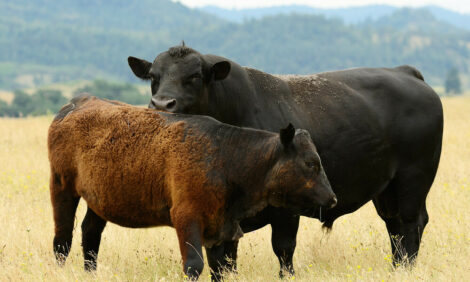



Dairy Farmers in Gicumbi Decry High Feed Costs
RWANDA - Dairy farmers in Gicumbi District are worried about the high cost of animal feeds, which they say has affected production.The farmers, who belong to Koperative Ihuza Aborozi ba Kijyambere Bafatanyije (IAKIB), a cooperative of dairy farmers in the Northern Province district, say a kilogramme of cattle feeds costs Rwf220 each. This is expensive considering that one cow consumes about four kilos daily, according to members of the Ngondori-based cooperative that brings together farmers from six sectors in the district.
Dairy farmers resorted to buying fodder from other dealers following a ban by the district authorities on feeds produced by the cooperative because of contamination, said Pierre Celestin Hakizimana, the IAKIB cooperative president.
IAKIB members used to buy the fodder that was being produced by the coop at Rwf150 per kilogramme before the ban.
However, Mr Hakizimana said that the feeds had caused milk contamination by the time the ban was announced. "This (contaminated milk) prompted the district authorities to ban the trade or use of the feeds as they were putting the sector and public health at risk," he said.
The co-operative’s milk has also been rejected by their main buyer, Inyange Industries, over contamination since November 2017. Mr Hakizimana explained that after Inyange turned away the milk, the group contacted the district extension staff for help, who discovered that the problem was from contaminated feeds.
"The district agriculture and animal resource officials advised us to stop using the feeds until a thorough inspection was done by Rwanda Standards Board (RSB).
"However, most of the farmers cannot afford the other brands on the market, which has affected milk production since the cattle are underfed," he said in an interview with The New Times.
"We used to collect 40,000 litres of milk per day from members before this problem came up. However, this has since dropped to about 27,000 litres of milk daily," he said.
He added that the feeds were all withdrawn from stores.
Dr Gilbert Gashirabake, the district agriculture officer, said the feeds were found with moulds, which indicates that either the grains or feeds were poorly stored. "When the maize or feeds are stored in high humidity places they develop the fungal hyphae, making them unfit for animal consumption," he explained.
RSB inspection
The cooperative is pondering their next move to ensure quality as they wait for results of the samples taken by RSB for examination. "RBS took samples of the feeds on 28 December 2017.
We’re still waiting for the results so we can find ways to address this problem," he said.
Philip Nzayire, the director for quality assurance at RSB, said the standards watchdog is still analysing the feed samples taken from the cooperative stores, adding that the results would be released soon.
"It takes about seven days to process the samples and as soon as they’re ready, we’ll immediately share them with all the concerned parties," said Mr Nzayire.
Counting losses
Mr Hakizimana said that, following the discovery, the farmers were instructed to stop milking for a week to allow for all traces of the contaminated feeds to clear and the cows to recover from the effects. This led the group to lose about Rwf18 million that week. The group sells a litre of milk at Rwf200. The cooperative’s milk collection has dropped by 13,000 litres per day, equivalent to Rwf2.6 million or Rwf78 million a month, according to Mr Hakizimana.
Way forward
Mr Hakizimana said the cooperative has already bought equipment for measuring moisture content in maize or contamination. They have already started educating farmers on how they can detect contaminated feeds. He added that they have encouraged members to buy from other suppliers in the meantime as they wait for results from the RSB analysis.
Dr Gashirabake said the feeds factory and storage facilities of the cooperative meet standards, adding that the contamination could have originated elsewhere during post-harvest handling of maize. He advised all maize dealers to always test the grains before buying them to avoid similar challenges.
"You may have good storage facilities, but that cannot help if the maize is already affected. If one has no the equipment to test the grains, they should approach the district for help because it takes collective efforts to develop and make the dairy industry more sustainable," he said.
TheCattleSite News Desk


